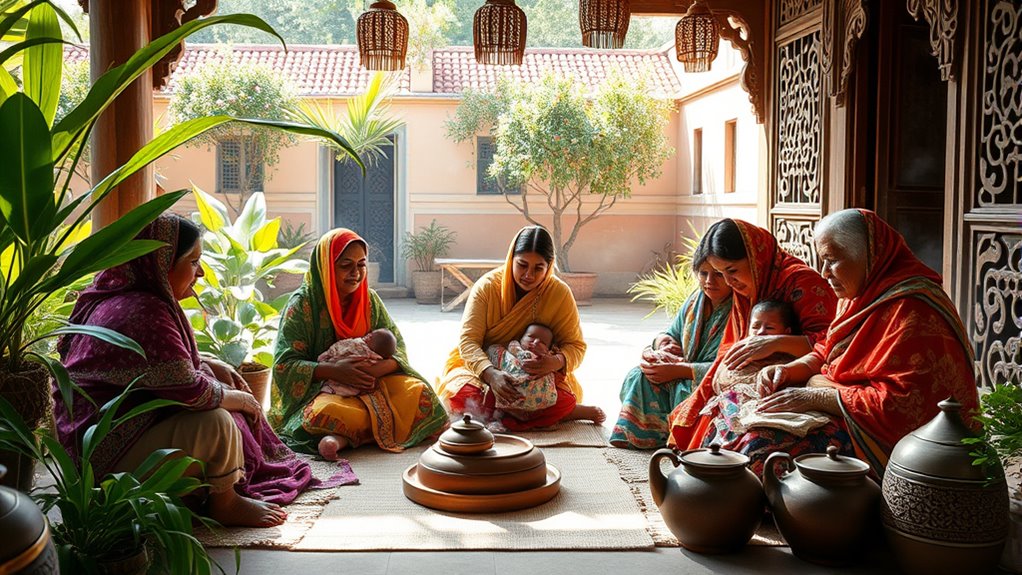Around the world, cultural norms shape postpartum support, emphasizing rituals, community involvement, and family care. Many traditions include confinement periods, special foods, herbal baths, and massages guided by elders. These practices aim to restore strength, promote healing, and strengthen bonds with the newborn. They reflect shared beliefs about health, fertility, and emotional stability. If you keep exploring, you’ll discover fascinating insights into how different societies nurture new mothers through timeless customs.
Key Takeaways
- Cultural norms shape postpartum support through rituals emphasizing recovery, bonding, and community involvement across diverse societies.
- Traditional practices often include confinement, special foods, herbal remedies, and massages to promote healing.
- Family members, especially elder women, play a central role in implementing and supporting postpartum rituals.
- Variations exist globally, reflecting cultural beliefs about health, fertility, and emotional well-being during postpartum.
- These customs foster community bonding, provide emotional reassurance, and symbolize wishes for health and prosperity.

Cultural norms deeply influence how new mothers receive support after childbirth, shaping expectations and practices across different societies. These norms often dictate specific traditional postpartum rituals that women follow to recover and bond with their babies. In many cultures, these rituals are more than just customs; they serve as a framework for ensuring both physical healing and emotional stability. For example, some societies emphasize confinement periods, where new mothers stay indoors for weeks to rest and recover, often with family members attending to their needs. During this time, traditional postpartum rituals might include special foods believed to restore strength, herbal baths, or massage practices that are passed down through generations. These rituals reinforce the idea that postpartum recovery is a communal effort, rooted in longstanding cultural beliefs. Additionally, some cultures incorporate specific practices to promote skin healing and overall well-being during this delicate period, emphasizing the importance of holistic recovery.
Family involvement customs play a pivotal role in these traditions. In many cultures, the family, particularly older women like mothers or grandmothers, takes a central role in supporting the new mother. They often oversee the implementation of traditional rituals, ensuring that the new mother adheres to prescribed practices. This involvement helps create a sense of continuity and cultural identity, as well as providing practical support like cooking, cleaning, and caring for the newborn. In some societies, the participation of family members is deeply ingrained, with specific roles assigned to each person based on age and gender. For instance, in East Asian cultures, family members might prepare special foods or perform rituals that symbolize health and prosperity for both mother and child. These customs serve to reinforce family bonds and shared cultural values during a vulnerable time.
In contrast, some cultures place less emphasis on family involvement, but still uphold traditional postpartum rituals that guide recovery. Regardless of the level of family participation, the core idea remains the same: postpartum support is a collective effort rooted in cultural beliefs. These rituals often carry symbolic meanings, representing wishes for health, fertility, and well-being. They also help new mothers navigate their new roles, providing reassurance and a sense of belonging within their community. By respecting these cultural norms, you gain insight into how societies view motherhood and the importance placed on communal support systems. Embracing these traditions can offer comfort and stability during what can be an overwhelming transition, highlighting the diversity and richness of postpartum practices worldwide.
Frequently Asked Questions
How Do Postpartum Traditions Influence Maternal Mental Health Globally?
Postpartum traditions profoundly influence your mental health by providing cultural rituals that offer emotional comfort and social support. When these rituals are positive and inclusive, they help reduce feelings of isolation and anxiety. Conversely, if traditions are restrictive or neglect your emotional needs, they can contribute to postpartum depression. Embracing supportive cultural practices can foster resilience, helping you navigate this challenging time with better mental well-being.
Are There Commonalities in Postpartum Support Across Different Cultures?
Imagine finding comfort in a warm circle of shared rituals and community support, no matter where you are. Across cultures, postpartum support often includes these elements—whether it’s a traditional confinement period or communal caregiving. These shared rituals foster connection and reassurance, highlighting a universal understanding that new mothers need care. Despite differences, the commonality lies in the collective effort to nurture maternal well-being through shared practices and community bonds.
How Do Modern Lifestyles Affect Traditional Postpartum Practices?
Modern lifestyles, influenced by urbanization challenges and technological impacts, often disrupt traditional postpartum practices. You might find it harder to follow community-based support systems or rest routines because of busy schedules and fast-paced urban living. Technology can both help and hinder, offering online advice but reducing face-to-face connections. To maintain cultural traditions, you need to intentionally create space for traditional practices amid these modern demands.
What Role Do Family Members Play in Postpartum Care Worldwide?
Family members, especially extended family, play a crucial role in postpartum care worldwide. They provide emotional support, assist with household chores, and help new mothers recover. Community involvement often strengthens this support system, ensuring new mothers don’t feel isolated. This tradition underscores the belief that postpartum care is a shared responsibility, fostering a nurturing environment. Your family’s active participation can markedly enhance a mother’s recovery and well-being during this essential time.
How Can Cultural Postpartum Practices Be Integrated Into Modern Healthcare?
You can integrate cultural postpartum practices into modern healthcare by respecting their ritual significance and emphasizing holistic healing. Incorporate traditional rituals as complementary therapies, educate healthcare providers about their importance, and create spaces for family involvement. This approach not only honors cultural traditions but also promotes emotional well-being and physical recovery, fostering a more inclusive and supportive postpartum care environment that bridges traditional wisdom with contemporary medicine.
Conclusion
Understanding global postpartum traditions shows how cultural norms shape support for new mothers. For example, in some cultures, women receive up to 40 days of continuous care, emphasizing community and rest. This highlights the importance of tailored support that respects cultural practices. By learning from these traditions, you can foster more compassionate, effective postpartum care that honors both individual needs and cultural values, ultimately improving maternal well-being worldwide.









